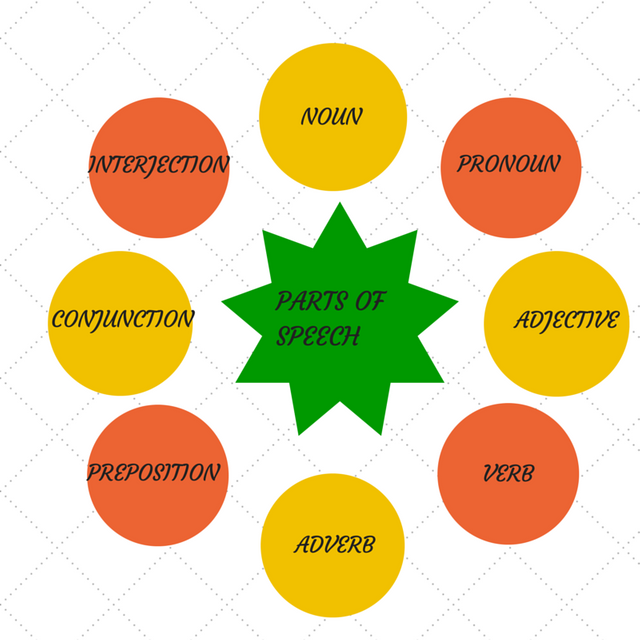English 101: Parts of Speech

One key to becoming a better writer is learning to recognize the parts of speech and to understand the relationships among these various components of a sentence.
It's important to note, however, that words can be different parts of speech depending upon the context in which they are used; for example, the word "love" can be a verb, adjective, or noun:
Marco loves Maria almost as much as he loves football. (Verb)
Marco sent Maria a love letter. (Adjective)
When Marco looked at Maria, he was overcome with love. (Noun)
Nouns
A noun is a word that identifies a person, place, or thing, and within sentences nouns function as the subject, direct object, indirect object, subject complement, or object of a preposition, for example:
Marco (subject) threw the football (direct object) across the yard (object of preposition).
Marco (subject) threw Maria (indirect object) the football (direct object).
Marco was a quarterback (subject compliment) in college (object of preposition).
Verbs
Verbs tell what a subject is, was, will be, or what it does, did, or will do. Some are "action" (intransitive) verbs while others are "linking" (transitive) verbs, for example:
Marco is a football fanatic. (Transitive)
Marco runs two miles each morning. (Intransitive)
There are simple verbs and verb phases (verb phrases have helping verbs), for example:
Marco loves football. (Simple verb)
Marco has loved football since he was a child. (Verb phrase)
Pronouns
Pronouns usually take the place of nouns within sentences, but there are seven different kinds of pronouns:
Personal: Distinguish between the individual speaking (first person), the individual spoken to (second person), and the individual spoken about (third person).
Demonstrative: Act as subjects and identify or point to specific individuals or things, for example, "This is Marco's car. That is Marco's house. These are Marco's shoes. Those are Marco's football trophies."
Indefinite: Do not indicate specific individuals or things, and include such words as "anybody, something, none, each, more, most," etc.
Intensive: Emphasize a particular noun or pronoun and include "yourself, himself, themselves," etc; for example, "Marco hurt himself playing football."
Reflexive: Formed like intensive pronouns, these show that the subject acts, acted, or is acting upon itself, for example: Marco hurt himself playing football.
Interrogative: Ask questions, for example: Who? What? Whose? Which?
Relative: Introduce dependent clauses, for example: The house that was on the corner has been demolished. The old man who lives next door is very "nice."
Adjectives
Adjectives modify or describe a noun or pronoun and can come either before the noun they modify or after the verb in a sentence, for example:
The tall man had to stoop to enter the room.
Marco is happy during football season
Sleek and fast, the jet streaked across the cloudless sky.
Note: Adjectives also include the articles "a, an," and "the."
Adverbs
Adverbs modify verbs, adjectives, and other adverbs, and contrary to popular belief, not all adverbs end in "ly." Some examples include the following:
Marco ran rapidly across the field. (The adverb "rapidly" modifies the verb "ran" and tells how he ran.)
It was so hot that Marco fainted from heat exhaustion. (The adverb "so" modifies the adjective "hot" and tells to what degree it was hot.)
Maria waited most impatiently for Marco to regain consciousness. (The adverb "most" modifies the adverb "impatiently" and tells to what degree she waited impatiently.)
Prepositions
Prepositions always have objects, which are the words or groups of words they are linking or relating in a sentence. Prepositions include such words as "about, across, despite, of, to, with, by, onto, inside, past, from, along with, instead of, " etc. For example:
Marco threw the football across the yard.
Marco tossed the football to Maria.
Marco decided to watch the Saints instead of the Broncos on Saturday.
Conjunctions
Conjunctions link words, phrases, or clauses within sentences; and there are three different types of conjunctions:
Coordinating: Link elements of equal grammatical weight (Two or more nouns, pronouns, prepositional phrases, verbs, etc) and consists of "and, but, yet, for, nor, or," and "so."
Subordinating: Link dependent clauses to independent clauses and include such words and word combinations as "although, while, because, when, even though, in order that, until," etc.
Correlative: Connect elements of equal grammatical weight, but unlike coordinating conjunctions, these are used in pairs and include "either/or, both/and, not only/but also," and' "neither/nor."
Interjections
Interjections are exclamations and may be followed by either an exclamation point or a comma, for example:
"Ouch!" Marco shouted when he cut himself shaving.
"Oh," Maria said, "but your clumsiness doesn't surprise me in the least."
"Darn it!" Marco said. "I'm bleeding."
In summary, as stated in the beginning, although there are eight distinct parts of speech, how a word is used often determines its role within a specific sentence.
However, knowing the eight parts of speech and their functions is important for individuals who wish to become more accomplished writers.